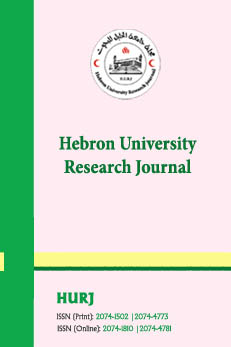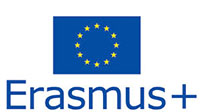College Facilities
1- Scientific laboratories
The College of Medicine at the University is distinguished by its medical and scientific laboratories as it cover the theoretical and practical aspects. Since its inception, the College of Medicine has been keen to equip many scientific medical laboratories equipped with all the needed devices and tools to enrich the educational and training process, as it provided specialized academic and technical staff to run these laboratories, which enhances the theoretical and practical knowledge of its students and sharpens their technical, diagnostic and research skills.
Hebron University has a strong infrastructure and a scientific environment that has enabled it to embrace the Faculty of Medicine. The University includes the College of Science and Technology with its various departments, College of Pharmacy and Medical Sciences, College of Nursing, Nutrition Program, and the Medical Laboratory Sciences. These colleges with its academic staff, facilities, laboratories and accumulated expertise have all been established to serve the new College of Medicine.
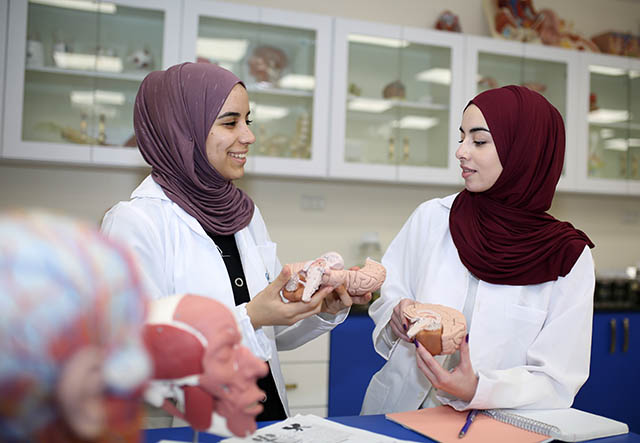
Anatomy Lab
The Anatomy Laboratory is one of the main pillars of the College of Medicine in order to give practical material in the field of anatomy to students of the College of Medicine and other related colleges such as the College of Pharmacy, Nursing, Medical Laboratories and others. This laboratory is well-equipped taking into account the limited number of students in the College of Medicine. This laboratory is fully equipped as follows:
- Advanced plastic models of different parts of the human body commissioned with German techniques and technology.
- Natural skeletons.
Providing the so-called Virtual Dissecting lab using a computer laboratory and special programs through which the student can identify and dissect various parts of the human body in a fictitious manner.
- CDs displayed to students through LCD projectors.
- Illustrations, Stereographs, and sections of the human body.
It is difficult to provide natural bodies as a result of social, political and customary obstacles in Palestine.
One of the future plans of the College of Medicine at Hebron University is to establish a forensic morgue to provide this service to the people of the region which will serve the College of Medicine in the field of anatomy courses.
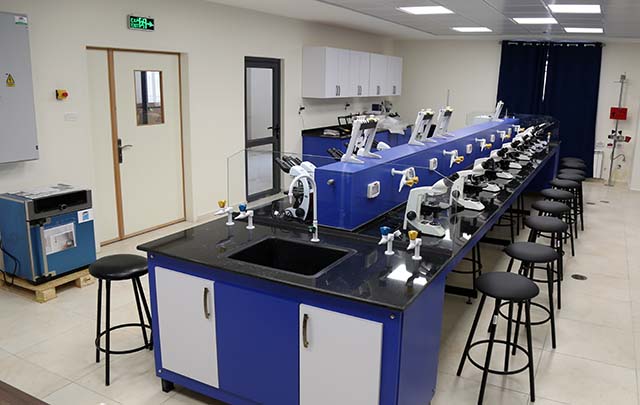
Physiology Lab
The laboratory promotes the relationship between theoretical and applied subjects where practical aspects of physiology are taught, and this lab is equipped with many devices and tools that enrich the teaching process especially ECG / EKG, manometer, spirometer and motion gauge in addition to various clinical laboratory examinations. It also contains some figures that show the functions of different body organs.
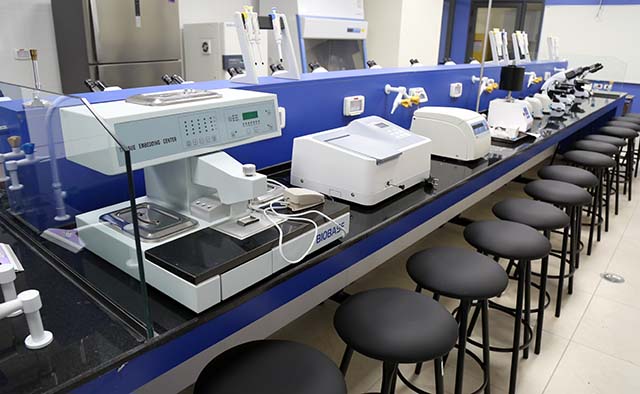
Histology Lab
This lab is equipped with some of the devices necessary to prepare different segments of body organs where students are taught in the scientific way to use the microscope and using it in the identification of different detailed images of the body where students recognize the natural form of tissues and cells of the body and prepare them as slides (histological slides) through micro technique technology. In addition to data projectors, videos, CDs, models, sensors and panels with network-connected computers.
Pathology Lab
The laboratory contains two parts:
Part 1 (Gross Pathology) contains a special museum that is developed to contain many pathological samples continuously as well as (software) where the student learns about the manifestations and effects of the disease on the organs of the body able to be seen by the naked eye.
Part 2: (Histopathology) Students learn about the manifestations and effects of the disease on the tissues of the different organs of the human body through a microscope attached to this lab, the possibility of preparing sections of sick tissues for examination under the microscope, as well as equipping sections with special pigments and studying the semantics of tissue tumors.
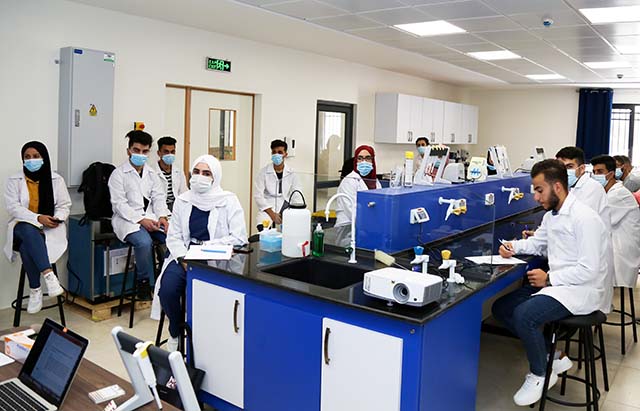
Chemistry Lab
Many practical applications are performed for the course of general chemistry, organic chemistry, medical biochemistry and clinical chemistry. This lab is equipped with devices and chemicals such as Spectrometer, Electrophoresis, hormone gauges and immune tests such as PH Meter.
Hematology Lab
The devices are constantly updated in order to keep pace with the development of hematology diagnosis, with CBC, Coagulometer, and Blood Film. The lab is equipped with microscopes and a slide projector to display groups of slides equipped with high techniques for anemia and leukemia.
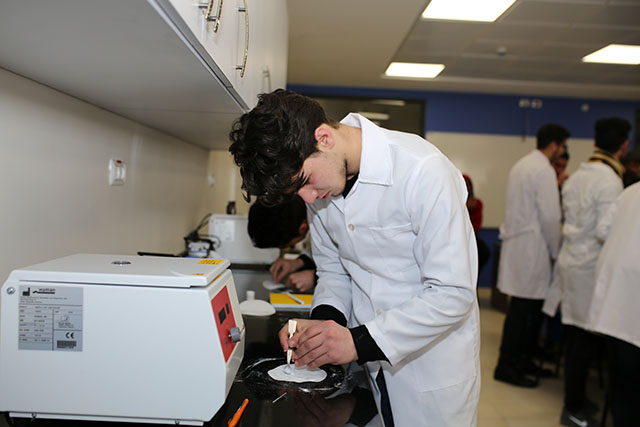
Molecular biology and genetics Lab
Due to the significant progress in genetics, the Department of Medical Sciences has developed an advanced genetics lab with state-of-the-art devices and technologies to enable us provide advanced services to the public, which are most needed for these services. These are not available locally and can only be conducted abroad which strains patients financially and physically. The lab currently provides educational and advisory services and is staffed by a group of researchers from inside and outside the University
Microbiology Lab
It contains many medical devices such as incubators, sterilizers and microscopes. Research students, masters and interested researchers from inside and outside the university shall benefit from this lab.
It also provides services to students of general medical microbiology, medical diagnostic microorganisms and medical parasites.
Medical Analysis Laboratory
The Medical Analysis Laboratory provides a distinguished service to the staff and students of Hebron University where it provides many basic laboratory tests. The College of Medicine aspires to this lab with more new devices in order to provide distinctive medical services by serving a larger segment both at the student and community level.
2- Libraries, references and periodicals
The library was founded along with the establishment of the Sharia College in 1971. It has grown from occupying a few rooms in the main building to occupy the 4th floor of the Omar bin Al Khattab building with a floor space of 1320 m², furnished and fitted with a university library collection of different sources to meet the needs of the increasing number of its colleges, specializations, staff , and students alike.
The library provides sources of printed and unprinted information through exhibitions or correspondence with various research centers and publishing houses, where the library's holdings have reached more than 53,000 knowledge containers. The library, furthermore, shares the Ebrary website, bringing the number of printed and electronic books to more than 100,000. The College also shares several databases, including Ebsco and Ibda', in addition to providing access to distinctive dissertations and many websites through the Palestinian Gathering of Information Centers and Libraries. The library uses the Dewey decimal classification system to organize its sources; an electronic index was built in cooperation with the University computer center and is constantly developed. A search screen has been created through the University website.
The library is subscribed to more than (10000) sources in the field of medicine and health sciences such as pharmacy, nursing and medical laboratories, as well as allied sciences, many available sources of medical electronic information are also available, the most important of which are: Ebsco, Ebrary, HINARI, Bioone, Cambridge Journals
Medical College Library
In addition to the University library, the college has established a library in the main building of the College of Medicine containing most of the books and references taught at the college according to the study plan and in the field of allied sciences, as well as many medical electronic sources.
The college also agreed with the Ministry of Health and some hospitals in the region, such as Alia Hospital and Al-Ahli Hospital, to use their libraries.


